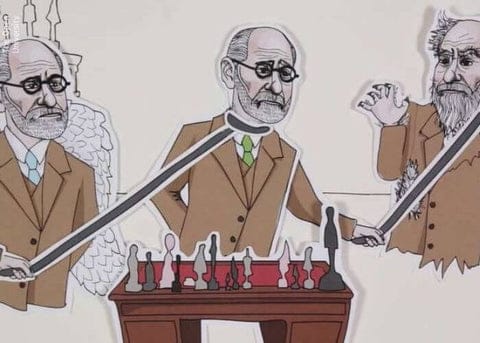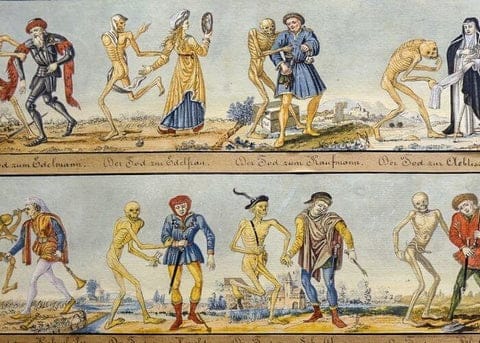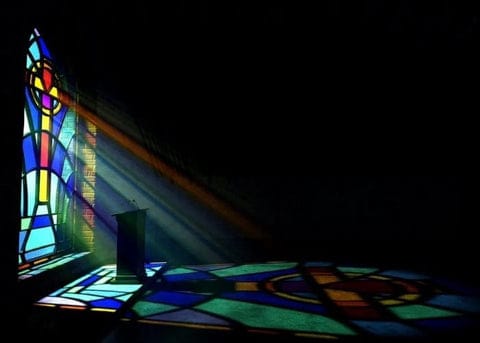What is the philosophical definition of death?
We know that human life is finite, which means that our time is strictly limited. The philosopher, Martin Heidegger, states that man is a being for death, with death being the only certainty that one has of this life and it must be understood according to the way that each one relates to the world.
Death is a universal phenomenon, a terminal and inevitable point, however, that is not how most individuals view it. It is well known that man, over time, has been trying and challenging death, because overcoming death and achieving immortality has always been the longing of humanity.
All living beings are born and die. What differentiates man from other living beings, however, is the awareness of his finitude, awareness of being mortal. In this way, man tends to move away from themes that cause him anguish. Among these, death. Everything about it tends to be avoided and it is very uncomfortable to be seen, thought, and spoken. Then, philosophers tried to study how knowledge of death affects human life. So let see together, what is the philosophical definition of death?
Death in The 21st century,
The 21st century, with its technology and digital capabilities, forces us to ask many questions about what death is all about. Nowadays, within the framework of bioethics, there is an interesting discussion about what are the criteria for death. In the past, everything was simple: a person stopped breathing, his heart no longer beats - it means that he is dead.
But today technology allows people to live in a coma, not to mention those who are constantly in a vegetative state. They breathe, but their consciousness no longer functions the way it does in healthy people. Are they alive? This is one of the most pressing issues of our time.
If you look at this death philosophical definition, you can recall that Heidegger and other philosophers who adhere to the phenomenological tradition are sure: death occurs at the moment when a person can no longer receive new experiences, even if traces of previous empirical experience of a person continue to live in digital format.

Death philosophical definition by Freud
For Freud, the death philosophical definition is: the cessation of the work of consciousness, even if the human body is functioning.
Due to the existence of death, our life has priorities. We cannot change everything in the world, so we have to choose. Most likely, most people's to-do lists contain tasks that can be completed in a lifetime. Otherwise, the choice may be meaningless. And people do it intuitively.
Awareness of one's finitude is associated with the concept of "value". In the essay "Transience" Freud wrote that the realization of the value of something comes when we understand that this something is not eternal. In his work, he described a flower that is beautiful because it blooms for only one night. The stronger the awareness of the finiteness of one's life, the more valuable certain things are to us.
Death philosophical definition by Martin Heidegger
Philosophers argue that thinking about the finiteness of others is much easier than realizing your own mortality. We understand this on a rational level, but not on a sensual level. Heidegger explains this by the fact that people tend to think about death in the future tense: “This will happen when I become very old. But now I am young, so there is nothing to worry about. "The philosopher calls this phenomenon "unreliability."
It allows you to go about everyday affairs and not think about the fact that there is no eternal life, and it is impossible to realize your actions and decisions at the moment. From the point of view of a philosopher, to do this, it is necessary to achieve the "certainty" of being, that is, to realize the initial meaninglessness of one's existence and to recognize death through sensory experience, for example, anxiety or longing.
Life and death are two completely different, incomparable concepts
In his 1927 book ‘Being and Time’, he states: Epicurus believed that the thought of death should be postponed altogether. For him, life and death are two completely different, incomparable concepts. In a letter to his friend, he explained that when a person is alive, death does not exist, because he cannot survive it while alive. And when a person is already dead, there is nothing else to worry about.
Thus, life and death, from his point of view, are in no way connected. In fact, there is a small amount of guile in this position. Or this answer may be called incomplete. Indeed, many people worry about things that are associated with death, and not about death itself. For example, they are afraid of becoming terminally ill or traumatized. They are afraid of events that could lead them to incapacity. They are afraid that they will have an accident or be eaten by a crocodile. So the fear of death includes other fears: fear of injury and illness. In the future, people will increasingly value honesty. And thanks to the death philosophical definition, they will be able to learn to live their life, to do what they like. In general, they will become more "authentic", real, as Heidegger wrote.

The being of man is a "being that walks towards death"
For Heidegger, man is especially mediated by his past: the being of man is a "being that walks towards death" and his relationship with the world takes shape from the concepts of worry, anguish, knowledge, and guilt complex.
The man must try to "jump", running away from his daily condition to reach his true "I". The panorama of his theory is that of the meaning of "being": the modes and ways of enunciation and expression of being. In this sense, the important thing is to achieve the best sense of being, to face death.
Death constitutes a limitation of the original unity of "being-there"
It means that human transcendence, "being-power" (Dasein), contains a possibility of not-being. Heidegger says:
"The 'end' of being-in-the-world is death. This end, which belongs to being-able, that is, to existence, limits and determines the ever-possible totality of Dasein".
However, the apparently negative character of death arises only when death is taken in the ordinary sense of being the moment of the physical end of life. But there is a positive side to death, that is, if the human being assumes his " being-for-death", that is, he takes into account that death is a phenomenon of his own existence and not of its ending.
Death only makes sense to those who exist and is seen as a fundamental fact of existence itself. Assuming being to death, however, does not mean constantly thinking about death, but facing death as a problem that manifests itself in existence.
The paradoxical aspect of death
After we have died we can no longer feel death. It is a fact that death is something that we can only experience indirectly, in the other that dies. Death has this paradoxical aspect of only appearing when it can no longer be a problem for Dasein unless he assumes it as his most essential essence in his own existence. In fact, the concept of death is a kind of expanded and more defined anguish towards a fundamental characterization of our existence.
There is an element of transcendence in death that can take us out of everyday occupations. The awareness of "being-to-death" leads to a questioning of the whole being, in the sense that the human being is placed radically before his being. Like anguish, "the anticipation of death singularizes the being-there".
In short, what Heidegger's existence analysis presents us with is the mutual interdependence of the concepts of fear, anguish, nothingness, and death. The role of these concepts consists, therefore, in generating in the human being, the being-there, a possibility to assume its authenticity.
Only from these phenomena does the turning point in human existence occur, when a man is touched in his being by the appeal of Being. His awakening does not occur through what is usually called joy or happiness. On the contrary, for Heidegger's ethics, the human finitude of moments of negativity is especially important.
Death philosophical definition by Plato and Epicurus
Contrary to the exacerbated emphasis on the world of ideas proposed by Plato, Epicurean philosophy has as its basic principle happiness (eudaimonia), obtained by the practice of ataraxia, that is, by the calm and apathy towards worldly appetites.
For that, their doctrines value pleasure as something natural, arguing that the fulfillment of our spontaneous desires can be beneficial to health - simultaneously, of body and soul - as long as balanced by the thoughtful use of reason.
Unlike Socratic-Platonic thinking, Epicurus' philosophy is marked by its predominantly hedonistic character, that is, favorable to moderate pleasures. One of Epicurus' great merits was that he helped to free people from fear, and above all, from death.
When considering the human being as a cohesive entity, formed by a set of atoms in movement, Epicurus conceives the end of life as a process as inevitable as natural, described as the simple dissolution of these elementary particles - which, later, will come together again, giving rise to other beings. The reason why the philosopher maintains: "Death means nothing to us".
Death philosophical definition by Arthur Schopenhauer
Schopenhauer presents death as a keystone for philosophy, as can be evidenced in some passages of his book "The metaphysics of death":
"Deep down, however, we are one with the world, much more than we are used to thinking: its intimate essence is our will; its phenomenon is our representation. For those who could be clearly aware of this being-one, the difference between the persistence of the external world, after one is dead, and the persistence itself after death. "
While philosophy remains unknown, man lives peacefully and it is the knowledge of its existence and the perception that it is finite that makes him fearful of death. This view reiterates the idea that one day matter will end:
"The animal lives without true knowledge of death: that is why the animal individual immediately enjoys all the imperishable character of the species, insofar as it is known only as an infinite of the species, insofar as it is only known as infinite. With reason, it appeared, necessarily among men, the frightening certainty of death ".
Death philosophical definition by Sören Kierkegaard
Kierkegaard, an existentialist thinker, defends the idea that "dying to death means living". And this thought would apply both individually and collectively, since my death or the death of others would represent a condition of living, both for me and for the spectators of my dying.
As the being is always a "being with others", during our existence we perceive several dying since the death of the other would imply in some way the death of a "certain" part of me that was part of the other. The pain of "existing" consists in seeing death overwhelm the existence of the non-self, realizing that I cannot rehearse my dying with the death of the other, since it is one of the unique and non-transferable experiences.
"Dying" and "not-dying" is not just touching an anesthetized and senseless body, it is wanting to "feel" and perceive a human subjectivity, which is no longer accessible, except through reports, writings, or even memories.
It is interesting to note that some people, even after they die, remain more actively in the lives of some who remain, than many alive. This "permanence" occurs in the sense that, some people are emotionally "trapped" in the existence of this person who is gone and end up not realizing the living ones that remained and that continue to exist. In this direction, the dead person does not exist in the world, but in terms of being, “those who remain can still be with him”. Thus, he claims:
Because the entity has its place in Being, no one needs to be upset. We know that being is what it is. If an entity is what it is, when dying, man ceases to be what he is, exists, or can exist to "be what he was".

Death philosophical definition by Friedrich Nietzsche
For the philosopher, death philosophical definition means, man experiences death in two ways, cowardly or voluntarily:
"Cowardly death can be defined, in a nutshell, as the experience of death as chance, whose immediate effect is the desire to die. In this case, one wishes to die because one dies. The lack of longevity of life is enough to abandon it. Those who think like that, Nietzsche will say, are the preachers of death ".
To substantiate the consequences of cowardly death, Nietzsche mentions the memory inherent in man, considered by him as the cause of all human suffering, being subjected to time that passes, losing the possibility of changing reality. The man has no real sense of time, being struck by death, which "seems to be an assaulting accident". Death appears to these people as a fatality.
Finally, the rage of death comes in the wake of the rage of time. The spirit of revenge, when condemning the time that prevents a man from being entirely what he is, condemns the inevitable death when he says: "everything perishes, everything, therefore, deserves to perish". In this sense, man's anger towards the inescapable finitude caused by time is reflected, as it could not fail to be, in the repulsion of death, the most radical change.
Conclusion
Thus, death philosophical definition and reflection are needed to solve specific problems associated with the dying process, to determine the time of death, and to overcome the fear of death. Philosophy as a need of the human spirit enables a person to remain a person in the face of death, i.e. to remain honest and courageous, rational and spiritual, without loss of personal dignity.


Leave a comment